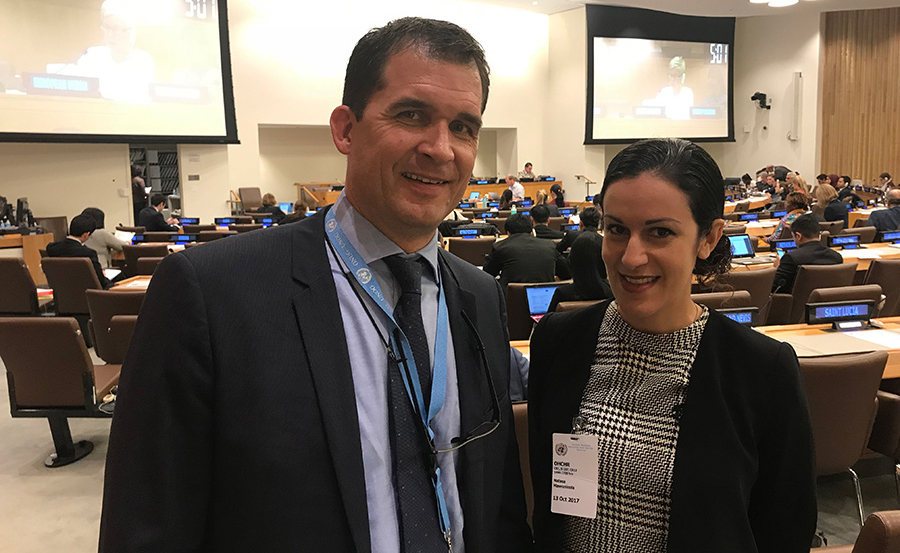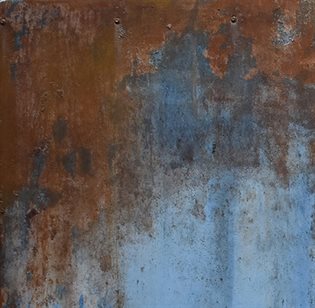 Nils Melzer and Natasa Mavronicola attending the United Nations General Assembly in New York
Nils Melzer and Natasa Mavronicola attending the United Nations General Assembly in New York
Dr Mavronicola’s research has informed a body of work for the United Nations Special Rapporteur on Torture and Other Cruel, Inhuman or Degrading Treatment or Punishment, Professor Nils Melzer. Serving as Special Advisor to the Rapporteur between March 2017 and July 2019, Dr Mavronicola collaborated closely with the Rapporteur in developing multiple flagship thematic reports which provide paradigm-shifting, globally applicable interpretations of the prohibition of torture and establish international best-practice standards on torture and other cruel, inhuman or degrading treatment or punishment, and which have already prompted on-the-ground change around the world.
A/72/178: Extra-custodial use of force and the prohibition of torture and other cruel, inhuman or degrading treatment or punishment (20 July 2017)
This report highlights that any unnecessary, excessive or otherwise arbitrary use of force by law enforcement officials is incompatible with the absolute prohibition of cruel, inhuman or degrading treatment. Additionally, where such force intentionally and purposefully inflicts pain or suffering on powerless persons it is conclusively unlawful, and may amount to torture. This has considerable implications for policing practices, including training, equipment, and relevant instructions.
Moreover, the report’s findings entail that certain weapons or riot control devices may be inherently cruel, inhuman or degrading, or (likely to be) used in a cruel, inhuman or degrading manner, and the acquisition, trade and use of weapons must be regulated and reviewed accordingly. As the report specifies, a weapon or device will be inherently cruel, inhuman or degrading, and therefore prohibited, if it is specifically designed, or is of a nature (that is, of no other practical use than) to employ unnecessary, excessive or otherwise arbitrary force, against persons.
A/HRC/37/50: Migration-related torture and ill-treatment (20 November 2018)
This thematic report tackles the incidence of torture and other cruel, inhuman or degrading treatment or punishment in irregular migration contexts, and establishes that many contemporary State practices on migration that States perceive or claim to be lawful in fact violate the prohibition of torture and ill-treatment. The report identifies various restrictive and obstructive migration laws, policies and practices that have pushed growing numbers of irregular migrants (including refugees, asylum-seekers, and/or torture victims) into grave danger and (further) abuse, in violation of the prohibition of torture and ill-treatment. In particular, the report condemns extraterritorial “pushback” and “pullback” operations, border closures, readmission arrangements that facilitate collective expulsion, and of mandatory detention based solely on migration status, and demands that States refrain from such abusive practices and foreground the protection of all persons on irregular migration journeys from torture and abuse.
A/73/207: Seventieth anniversary of the Universal Declaration of Human Rights: reaffirming and strengthening the prohibition of torture and other cruel, inhuman or degrading treatment or punishment (20 July 2018)
 Eleanor Roosevelt holding poster of the Universal Declaration of Human Rights (in English), Lake Success, New York. November 1949. - By FDR Presidential Library & Museum - CC BY 2.0
Eleanor Roosevelt holding poster of the Universal Declaration of Human Rights (in English), Lake Success, New York. November 1949. - By FDR Presidential Library & Museum - CC BY 2.0
This report, marking the 70-year anniversary of the recognition of torture’s absolute prohibition in human rights law through the Universal Declaration of Human Rights, tackles the most significant ways in which the prohibition’s realisation is undermined across the world today, and provides recommendations towards better upholding it. It addresses attempts at circumventing and misinterpreting the prohibition and underlines that the prohibition of torture and ill-treatment is not just a technicality to be manoeuvred around in the pursuit of desired government action, but a fundamental norm which embodies the humanism of the international legal edifice, and whose letter and spirit must be followed in all State pursuits. Crucially, the report also makes explicit the way in which torture and ill-treatment proliferate in contexts of systemic or structural discrimination, inequality, or disempowerment. The report establishes that alleviating circumstances conducive to such ill-treatment therefore requires a systematic overhaul of ‘legal, structural and socioeconomic conditions that may increase exposure to violence and abuse by State officials and non-State actors’ (para 77(i)).
A/HRC/40/59: The relationship between corruption and torture or ill-treatment (16 January 2019)
 This report unpacks key patterns of interaction between corruption and torture, and outlines the circumstances conducive to the occurrence of both phenomena. The report highlights the particular and accumulated impact of both torture and corruption on persons who are discriminated against and/or socioeconomically marginalised. It offers recommendations towards strengthening the protection against torture and ill-treatment in contexts affected by corruption, in both custodial and non-custodial settings, including the recommendation of mutual mainstreaming: that the prevention of torture and ill-treatment should be systematically incorporated into anti-corruption policies and practices and the prevention of corruption should be systematically incorporated into anti-torture policies and practices. The report also mandates proactive efforts to ensure adequate funding, training and equipping of public services and institutions, and fostering a general culture of personal and professional integrity throughout all public services, and towards alleviating social exclusion, socioeconomic marginalization and discrimination, which increase exposure to torture and corruption.
This report unpacks key patterns of interaction between corruption and torture, and outlines the circumstances conducive to the occurrence of both phenomena. The report highlights the particular and accumulated impact of both torture and corruption on persons who are discriminated against and/or socioeconomically marginalised. It offers recommendations towards strengthening the protection against torture and ill-treatment in contexts affected by corruption, in both custodial and non-custodial settings, including the recommendation of mutual mainstreaming: that the prevention of torture and ill-treatment should be systematically incorporated into anti-corruption policies and practices and the prevention of corruption should be systematically incorporated into anti-torture policies and practices. The report also mandates proactive efforts to ensure adequate funding, training and equipping of public services and institutions, and fostering a general culture of personal and professional integrity throughout all public services, and towards alleviating social exclusion, socioeconomic marginalization and discrimination, which increase exposure to torture and corruption.
A/74/148: Relevance of the prohibition of torture and other cruel, inhuman or degrading treatment or punishment to the context of domestic violence (12 July 2019)
 This report establishes that domestic violence in virtually all circumstances amounts to cruel, inhuman or degrading treatment, and in some circumstances may amount to torture, irrespective of whether it may be attributed to the State. It establishes that States bear positive obligations to prevent, protect against, respond to and offer redress for domestic violence and identifies practices such as coercive control and reproductive coercion as examples of such abuse. Underlining the importance of foregrounding the rights and needs of victims, including the best interests of the child, it makes a series of recommendations towards mitigating risks of domestic violence and empowering (potential) victims, notably by demanding accessible helplines, shelters, the provision of socioeconomic support, and steps towards dismantling patriarchal and discriminatory structures in which such abuse proliferates. The report also highlights that under no circumstances should States send persons to places where they face a real risk of domestic violence.
This report establishes that domestic violence in virtually all circumstances amounts to cruel, inhuman or degrading treatment, and in some circumstances may amount to torture, irrespective of whether it may be attributed to the State. It establishes that States bear positive obligations to prevent, protect against, respond to and offer redress for domestic violence and identifies practices such as coercive control and reproductive coercion as examples of such abuse. Underlining the importance of foregrounding the rights and needs of victims, including the best interests of the child, it makes a series of recommendations towards mitigating risks of domestic violence and empowering (potential) victims, notably by demanding accessible helplines, shelters, the provision of socioeconomic support, and steps towards dismantling patriarchal and discriminatory structures in which such abuse proliferates. The report also highlights that under no circumstances should States send persons to places where they face a real risk of domestic violence.